|
Light Delivery Vehicles Limited |
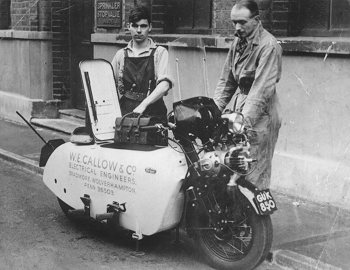
The Turner 168 c.c., two-stroke
'By-van'. Stan Simmons is putting his tools away, while boss
Richard Lee looks on. Courtesy of the late Jim Boulton. |
In the late 1940s the Turner Manufacturing Company
Limited, of Wolverhampton formed a separate company called 'Light
Delivery Vehicles Ltd', (L.D.V.) which operated from Turner’s Lever
Street factory.
L.D.V. produced the two wheeled 'By-Van', and the three
wheeled 'Tri-Van', and 'Rixi'. |
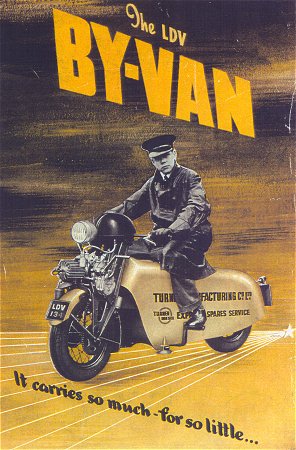
The front cover of the sales
literature. Courtesy of Brian Shaw. |
|
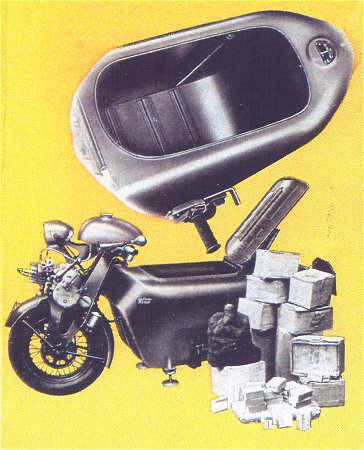
The photograph shows the volume of
goods that can be carried in a 'By-Van'. From the sales
literature. Courtesy of Brian Shaw. |
|
The 'By-Van' was a motorcycle, equipped with a
steel carrying box, which had a capacity of 5.57 cubic feet, and could
carry a load of up to 1.5cwt.
The 'Tri-Van' had two rear wheels, and a larger
container, which had a capacity of 23 cubic feet, and could carry a load
of up to 3 cwt.
The 'Rixi' was a rickshaw taxi, capable of carrying
two passengers and the driver.
The three models were powered by a Turner 168 c.c.
single-cylinder two stroke engine, mounted above the front wheel, which
developed 3.5 b.h.p. at 2,500 r.p.m.
The 'By-Van' had a 2-speed gearbox, and the
'Tri-van' and 'Rixi' had a 3-speed gearbox. They had a top
speed of 30 m.p.h. with all day cruising at 20m.p.h. The
'By-Van' sold for £120 and the
'Tri-Van' sold for £150.
Unfortunately little interest was shown in the
products, which only sold in small numbers. |
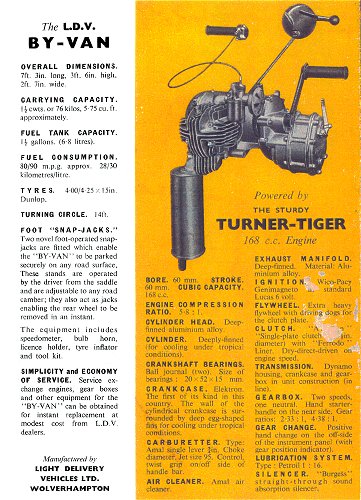
Courtesy of Brian Shaw. |
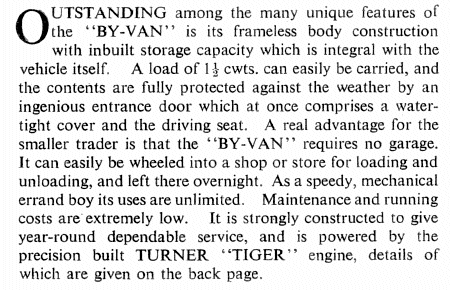
From the sales literature. Courtesy of Brian Shaw.
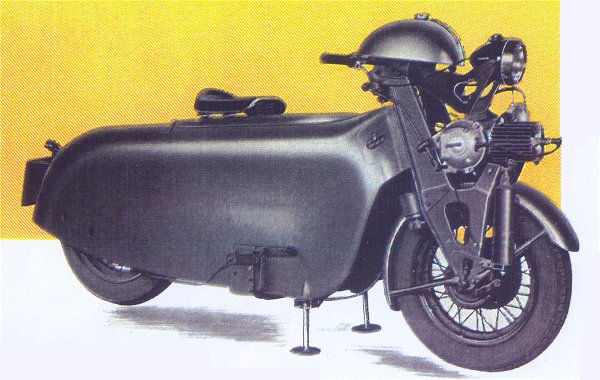
A 'By-Van', as seen in the sales literature.
Courtesy of Brian Shaw.
| Brian Shaw's 'By-Van'.
As seen at the 2007 Festival of
Black Country Vehicles, at the Black Country Living Museum. |
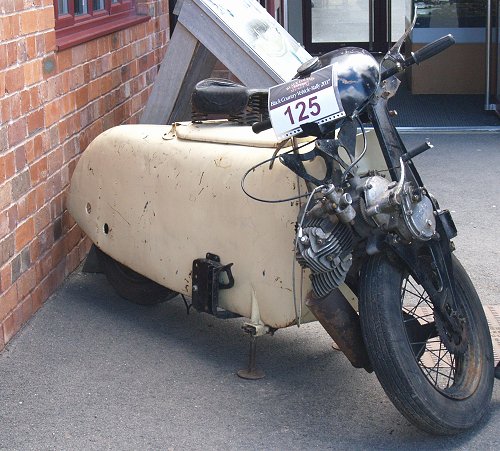 |
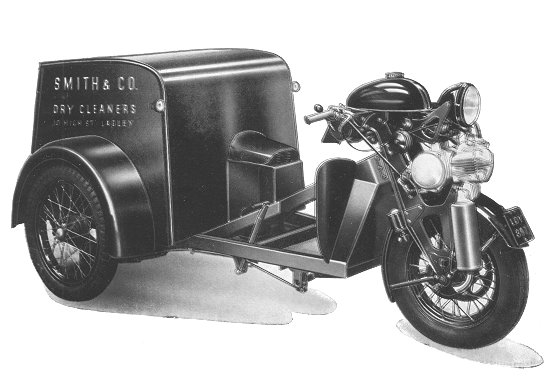 |
A 'Tri-Van'.
From the sales literature.
Courtesy of Brian Shaw. |
| This photograph, also from the
sales literature, shows the volume of goods that can be
carried in a 'Tri-Van'. It can carry up to 3 cwt.
Courtesy of Brian Shaw. |
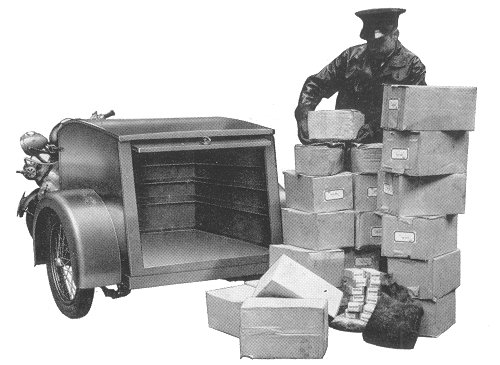 |
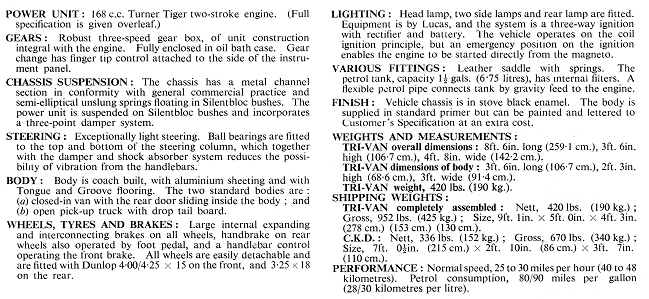
The 'Tri-Van' specification. Courtesy of Brian
Shaw.
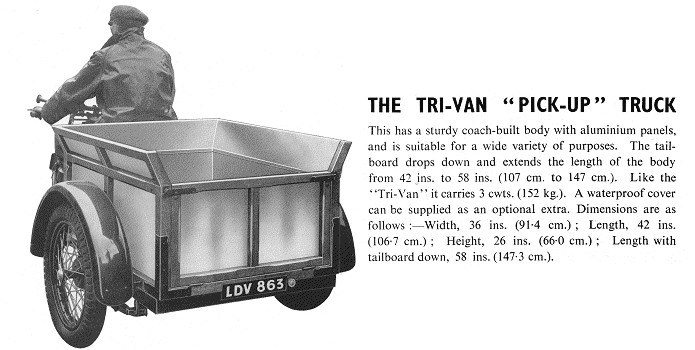
The 'Tri-Van' was also available as a pick-up
truck. Courtesy of Brian Shaw.
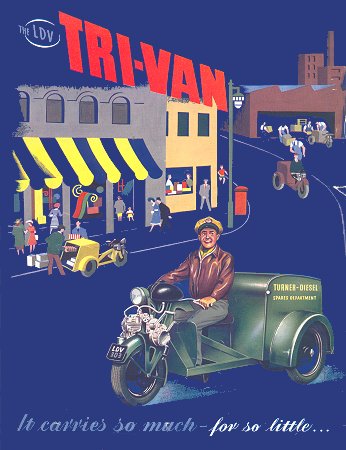
The front cover of the 'Tri-Van' sales
literature. Courtesy of Brian Shaw. |
In 1946 a 'By-Van' was demonstrated in Brussels,
but little interest was shown in the machine.
It was powered by a 125 c.c. Royal Enfield 'Flying Flea'
engine, which was mounted on top of the pressed steel forks. |
| A diagram from the sales
literature showing the front part of the 'Tri-Van'.
Courtesy of Brian Shaw. |
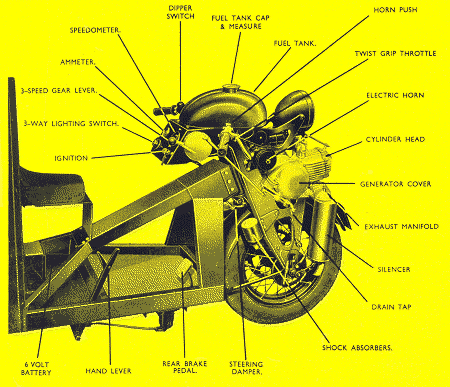 |
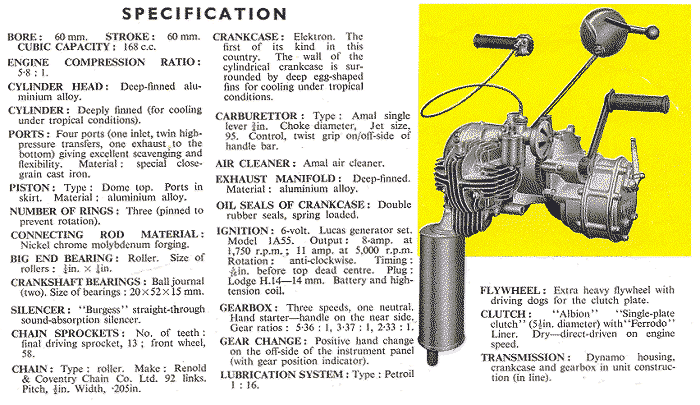
The specification of the 168 c.c. Turner 'Tiger'
engine. Courtesy of Brian Shaw.
|
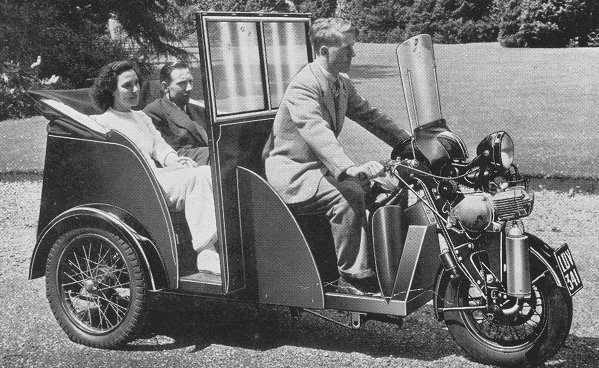
A 'Rixi'. Courtesy of Brian Shaw. |
The 'Rixi', a version of the 'Tri-Van', was
intended as a taxi for the far east, but like the other two products it
was not successful, and did not sell. One 'Rixi' was a familiar sight in
Wolverhampton during 1950 when it was operated by Bob's Taxis of North
Street. |
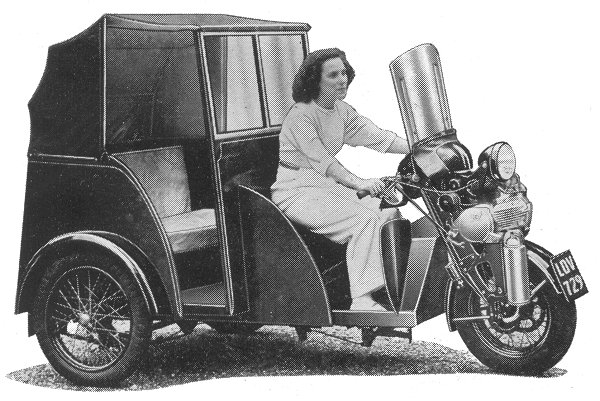
Another 'Rixi'. Courtesy of Brian Shaw.
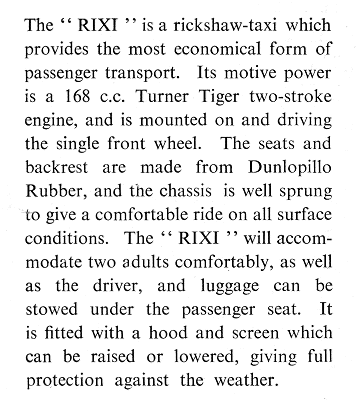 |
A description from the 'Rixi'
sales literature. Courtesy of
Brian Shaw. |
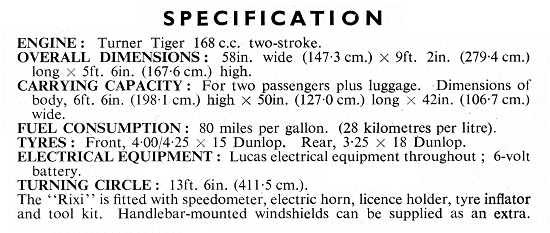
The 'Rixi' specification. Courtesy of Brian Shaw.
|
The 'Rixi' that was
used by Bob's Taxis
of North Street, Wolverhampton.
Courtesy of the late
Jim Boulton. |
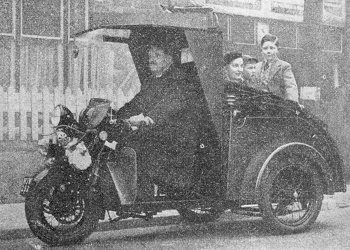 |
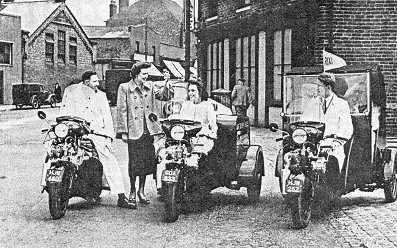
The By-Van, Tri-Van, and Rixi about to
set off on their epic journey. Actress Sally Rogers wishes them good luck.
Courtesy of Derek Beddows. |
As part of a publicity exercise, a 'By-Van',
'Tri-Van', and a 'Rixi' undertook a 2,000 mile trip. The part was from
Wolverhampton to Land's End and back, then from Wolverhampton to John
O'Groats, and back. The idea was to show that the three machines, which
were designed to undertake short distance work, could accomplish the
feat without mechanical trouble or breakdowns. The trio left Lever
Street at 10a.m. one Friday morning and arrived at their
first overnight stop in Wellington, Somerset at 6.20p.m. The
following morning they set off for Paul, near Penzance,
their next stopping place. Sunday was a rest day apart from
a short run in the afternoon. |
|
Early on Monday morning they left for Land's
End, where photographs were taken, and then proceeded to Exeter for
another overnight stop. At 8.30a.m. the following morning they returned
to Wolverhampton for an overnight stop, travelling via Bristol and
Gloucester.
At 7.45a.m. on Wednesday morning the trio assembled
on Tettenhall Green where Turner's Managing Director Mr. P. B. Dumbell
and L.D.V.'s Managing Director Mr. F. L. Tildersley were on hand to wish
them well. They set off at 8.15a.m. and travelled to Kendal, where they
arrived at their hotel at 6.45p.m.
The next day they travelled to Stirling, and on
Friday proceeded to Inverness, in readiness for their journey to John
O'Groats the following day. After an early start the jubilant trio
arrived at John O'Groats at 7.00p.m. where they were greeted by the
locals.
Sunday was to be an easy day and so they travelled
about 60 miles to the fishing village of Brora for an overnight stay. On
Monday they began their return journey, travelling to Fort William and
Ballachulish, where they spent the night. The day had been a testing one
because of the extremely wet weather, which often occurs in the area.
Tuesday was also a very wet day and they decided to
work the machines hard on their journey through Glencoe and across
Rannoch Moor to see if any defects could be found. That day they
travelled to Edinburgh via Glasgow and received an enthusiastic welcome
on their arrival in Edinburgh, where photographs were taken in the
castle forecourt.
On Wednesday they travelled to Durham, and then to
Sheffield the following day. Their journey ended on Friday at 1.47p.m.
when they arrived back at Lever Street Works to be warmly welcomed by a
large number of onlookers. The average fuel consumption for the whole
trip was 83m.p.g. for the 'By-Van' and 74m.p.g. for the 'Tri-Van'. They
did not travel lightly as the 'By-Van' carried a load of 1cwt. and the
'Tri-Van' carried 2cwts. The 'Rixi' carried one passenger, along with the
driver, and 50lbs in weight. This was a fitting tribute to the excellent
engineering and design work, that went into the products. |
| This photograph shows the 'By-Van'
that was demonstrated in Brussels in 1946. It is being tried
out in a Brussels Street. |
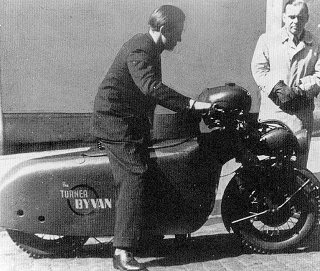 |
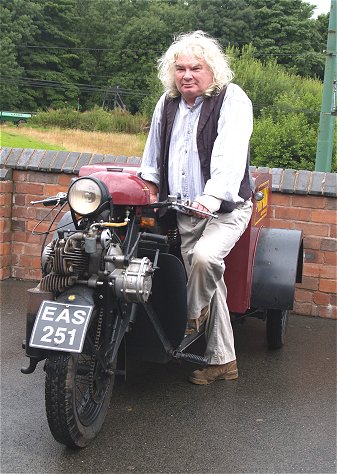 |
The only surviving L.D.V.
'Tri-Van' known, and its owner Mr. Hardie.
Seen at the 2009 Festival of
Black Country Vehicles at the Black Country Living
Museum, Dudley. |
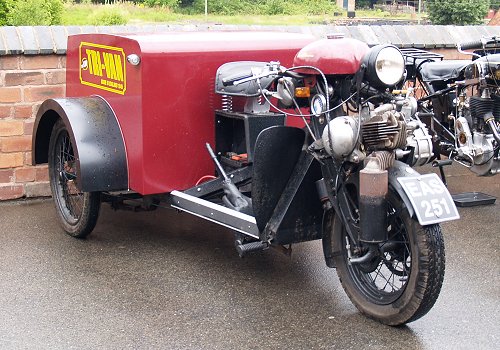 |
Another view of the 'Tri-Van'. |
| A final view of Mr. Hardie's
'Tri-Van'. |
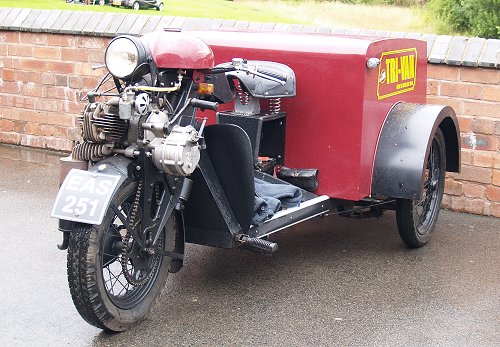 |
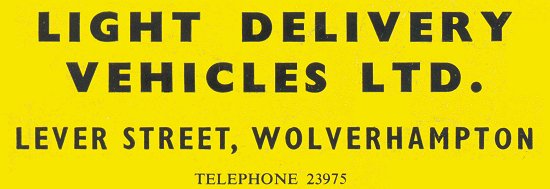
|